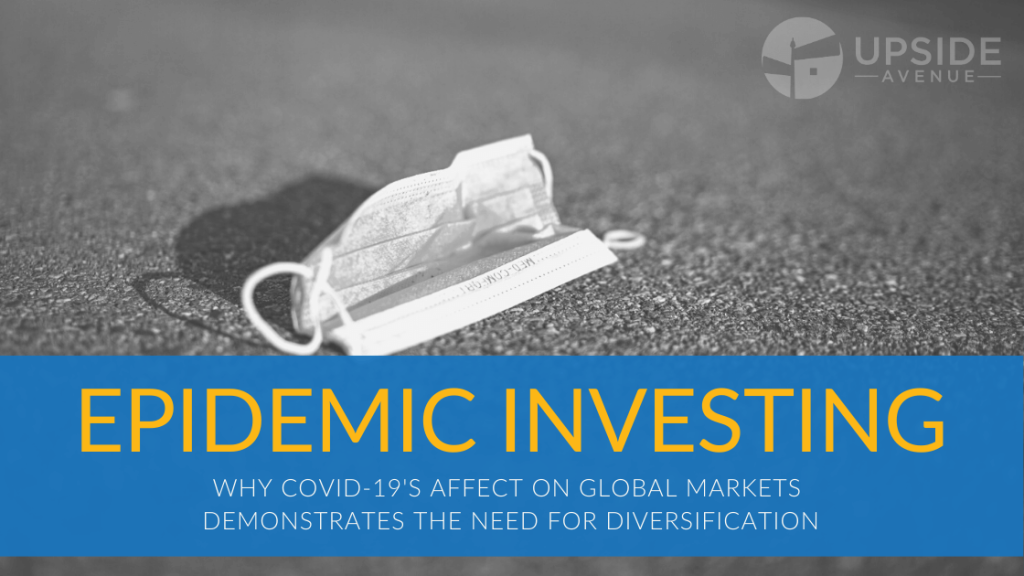The stock market just experienced its biggest drop since 2008 thanks to the reverberating effects of Coronavirus. How should investors respond?
…
The Centers for Disease Control (CDC) expects that the coronavirus (Covid-19) outbreak will continue spreading in the United States, with the World Health Organization officially naming the illness as a pandemic. This outbreak is spreading uncertainty amongst global stock markets and highlights the importance of asset diversification.
While we are optimistic that the U.S. economy will weather this crisis as it has many others, this outbreak gives us a good look into how to maintain financial stability during these uncertain and potentially wealth-damaging situations.
The stock market and uncertainty
The spread of Covid-19 has wiped out trillions of dollars in value as the stock market reacts to the prospect of massive economic disruption. Economists believe that this could be a long-term problem as supply chain shortages become more evident. Consumer activity driven by health concerns is also on the decline. Fueled by massive media reach and conflicting reports, this economic uncertainty is strongly reflected in stock market behavior.
The stock market drives the majority of portfolio growth for U.S. investors. The recent market upheaval, which erased tremendous amounts of wealth overnight, is putting investors on the defensive.
This is not the first time that stock markets have taken a hit due to an element outside of anyone’s control. Unforeseen and uncontrollable events happen on an all-too-frequent basis. Having healthy diversification is the best way to roll with the punches when faced with this level of volatility.
What role does real estate play?
Instead of being on the defensive after-the-fact, saavy investors understand the protective benefits that non-correlated alternative asset classes offer.
Because these alternative asset classes, like private real estate, are generally not connected to the performance of the stock market, they provide a hedge against stock market volatility. Real estate in particular not only provides a protective hedge but also can appreciate in value on its own.
Individual investors tend to not be as aware of the importance of balancing their portfolio into alternative asset classes. Endowments and funds allocate between roughly 20-50% of their portfolio into alternatives, but individuals allocate only about 5% of their portfolio into alternatives. There is clearly a strategic advantage in the portfolio-balancing effect that these larger investors are utilizing to their benefit.
The on-ground reality
The 30-year fixed-rate mortgage averaged 3.29% for the week ending March 5, which is the lowest level in its nearly 50-year history.
In Washington state, where most U.S. coronavirus deaths have occurred up to today, there are reports of reduced real estate transactions due to sellers not wanting to meet in person.
In China, where the virus originated and has had the most economic impact, the consumer real estate market has been almost entirely put on hold, with the few (mainly investment) transactions that are occurring only taking place over e-buyer apps.
The U.S. maintains a strong demand for new housing, and national real estate market sentiment remains high. However, the U.S. depends on China for some construction materials and the coronavirus will likely add to the shortage of U.S. housing supply.
Historically, low interest rates and strong demand is a recipe for a strong real estate market. Though a recession due to the economic factors exacerbated by Covid19 is possible, the dearth of new construction that has taken place and will likely continue happening should soften the worst potential outcomes of a recession on the housing market.
Multifamily REITs are a good choice
Balance and diversification are the two keys to protecting your portfolio from the upheaval and uncertainty that a global pandemic can have on publicly-traded stock markets.
Along with hedging against stock market volatility, one of the benefits of investing in a private real estate investment trust, like Upside Avenue, is that the share price is directly correlated to the assets in the portfolio, and not based on investor behavior like with a publically-traded REIT.
Alternative asset classes like private real estate are generally out of reach for individual investors due to the large price tag to access the investment. Upside Avenue solves that problem by offering access to shares of its non-traded REIT for a minimum investment of $2000.
Learn more about the benefits of investing in a non-correlated REIT at upsideavenue.com.


